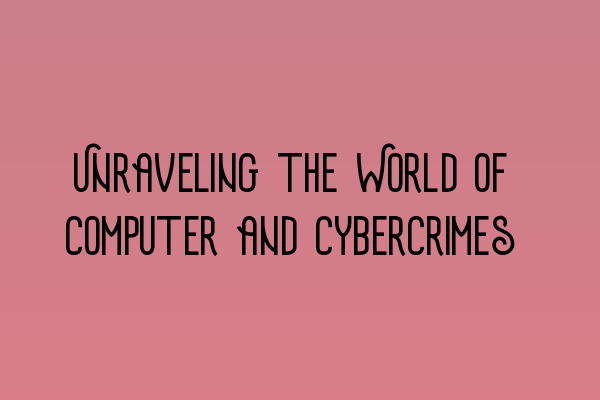Unraveling the World of Computer and Cybercrimes
In today’s digital era, where technology has become an integral part of our lives, the world of crime has also evolved. Computer and cybercrimes have become increasingly prevalent, posing significant threats to individuals, businesses, and even governments. In this blog post, we will delve into the intricacies of computer and cybercrimes, exploring their various types and the legal implications they carry.
Understanding Computer Crimes
Computer crimes encompass a wide range of illegal activities that are committed using computer systems or networks. From hacking and identity theft to unauthorized access and copyright infringement, these crimes involve the use of technological means to perpetrate unlawful actions. The consequences of computer crimes can be devastating, leading to financial loss, reputational damage, and invasion of privacy.
Cybercrimes: An Unseen Threat
Cybercrimes, on the other hand, involve criminal activities that are carried out over the internet or through digital systems. These crimes often target sensitive information, such as personal data, financial records, and trade secrets. With the rise of social media platforms, online banking, and e-commerce, cybercriminals have an abundance of opportunities to exploit unsuspecting individuals and organizations.
The Role of Law in Combating Computer and Cybercrimes
Legislation plays a crucial role in combating computer and cybercrimes. It provides a legal framework to prosecute offenders, safeguard victims, and protect the overall integrity of digital systems. As solicitors at SQE Criminal Law & Practice Law UK, we are committed to staying up-to-date with the ever-evolving legal landscape surrounding these crimes. Our expertise allows us to navigate complex cases and provide robust legal representation for our clients.
The Various Types of Computer and Cybercrimes
Computer and cybercrimes can take numerous forms, but let’s take a closer look at some of the most common types:
- Hacking: Unauthorized access to computer systems or networks with malicious intent. Read about SQE 1 Practice Mocks FLK1 FLK2.
- Identity Theft: Stealing someone’s personal information, such as passwords or social security numbers, to commit fraud or other illegal activities.
- Phishing: Sending fraudulent emails or messages to trick individuals into revealing sensitive information, such as login credentials or credit card details.
- Malware Attacks: Distributing malicious software, such as viruses or ransomware, to infect computers and steal data. Learn more about SQE 1 Practice Exam Questions.
- Cyber Bullying: Using digital platforms to harass, threaten, or intimidate individuals, often leading to emotional distress and even suicide.
- Data Breaches: Unauthorized access to sensitive data stored by individuals, businesses, or governments, often resulting in significant financial and reputational damage.
The Consequences of Computer and Cybercrimes
The impact of computer and cybercrimes can be far-reaching. Individuals and businesses may suffer financial losses, endure reputational damage, and experience emotional distress. Governments also face significant challenges in protecting their critical infrastructure and ensuring the safety of their citizens’ data. As a result, the legal consequences for offenders can be severe, ranging from hefty fines to imprisonment. Stay updated on the latest SRA SQE Exam Dates.
Protecting Yourself from Computer and Cybercrimes
Prevention is key when it comes to computer and cybercrimes. Here are some essential measures you can take to protect yourself:
- Keep your devices and software up to date to ensure you have the latest security patches.
- Create strong, unique passwords and use two-factor authentication whenever possible.
- Be cautious of suspicious emails, attachments, or links.
- Regularly back up your important files to an external storage device or cloud storage provider.
- Use antivirus software and firewalls to protect your devices from malware.
- Stay informed about the latest online scams and cyber threats to avoid falling victim.
Conclusion
In conclusion, computer and cybercrimes pose significant threats in today’s digital age. Understanding the various types of crimes, their legal implications, and taking preventive measures can go a long way in protecting yourself and your organization. At SQE Criminal Law & Practice Law UK, we have the expertise to handle computer and cybercrime cases with professionalism and dedication. Contact us today to learn more about our SQE 2 Preparation Courses and SQE 1 Preparation Courses.
